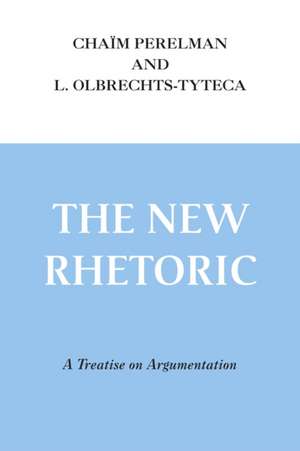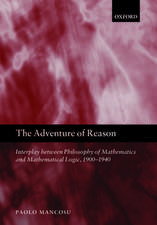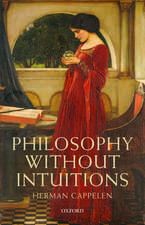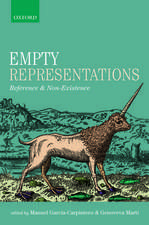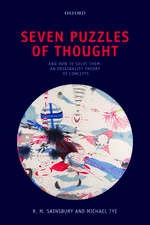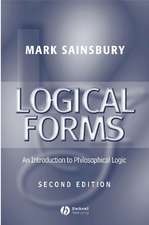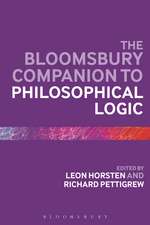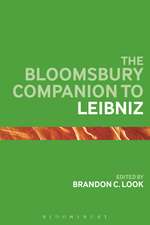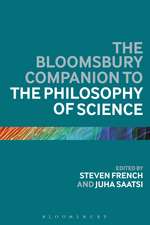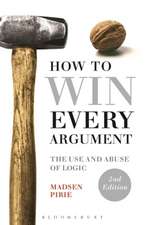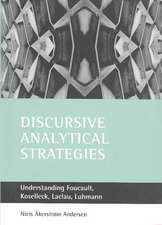New Rhetoric, The – A Treatise on Argumentation
Autor Chaïm Perelman, L. Olbrechts–tytecen Limba Engleză Paperback – 29 sep 1991
| Toate formatele și edițiile | Preț | Express |
|---|---|---|
| Paperback (1) | 288.05 lei 6-8 săpt. | +54.76 lei 4-10 zile |
| MR – University of Notre Dame Press – 29 sep 1991 | 288.05 lei 6-8 săpt. | +54.76 lei 4-10 zile |
| Hardback (1) | 700.88 lei 6-8 săpt. | |
| MR – University of Notre Dame Press – 30 oct 1973 | 700.88 lei 6-8 săpt. |
Preț: 288.05 lei
Nou
Puncte Express: 432
Preț estimativ în valută:
55.17€ • 56.84$ • 46.21£
55.17€ • 56.84$ • 46.21£
Carte tipărită la comandă
Livrare economică 24 februarie-10 martie
Livrare express 17-23 ianuarie pentru 64.75 lei
Preluare comenzi: 021 569.72.76
Specificații
ISBN-13: 9780268004460
ISBN-10: 0268004463
Pagini: 576
Dimensiuni: 152 x 227 x 33 mm
Greutate: 0.75 kg
Ediția:1
Editura: MR – University of Notre Dame Press
ISBN-10: 0268004463
Pagini: 576
Dimensiuni: 152 x 227 x 33 mm
Greutate: 0.75 kg
Ediția:1
Editura: MR – University of Notre Dame Press
Recenzii
"It is difficult to see how any rhetorician, rhetorical critic, logician interested in verbal logic, or student of either philosophical or popular argument can claim full competence without familiarity with this work. It challenges the orthodoxies of all and suggests fresh modes of inquiry to all." —The Quarterly Journal of Speech
"[A] readable English translation of this highly influential work in which Perelman and Olbrechts-Tyteca point out historical and systematic inadequacies in much of contemporary logic and methodology." —The Review of Metaphysics
"An important work representing the recent increase of interest in rhetorical studies among Continental scholars. . . . The interest of philosophers of the rank of Perelman and Olbrechts-Tyteca in rhetoric marks a significant break from the influence of Ramus and Descartes upon Western philosophy's concept of reason and reasoning. An important work, highly recommended." —Choice, March 1970
"One of the best features of the book is that the authors have not merely described kinds of argument used in persuasive discourse, but have constantly shown how such arguments can be countered—and not merely by one's saying 'but that doesn't follow logically'. Even if we abandon the slogan 'deductive or defective' we are not required to abandon all criticism of nondeductive arguments. The non-logical has its own logic." —Mind, October 1971
"An important book, which should initiate re-estimation of the importance of a liberal art central to antiquity and the Renaissance, latterly eclipsed by the . . . logic of science and mathematics. . . . Dealing primarily with the written word, the authors analyze the constant and the variables in all argumentation, whether addressed to a universal audience or to one's self. Perelman claims that this work marks a break with a concept of reason which has dominated Western thought for three centuries. In 550 pages, he makes a good case for the claim." —The Key Reporter, Autumn 1970
Notă biografică
Chaïm Perelman (1912–1984), a Polish-born philosopher of law, studied, taught, and lived most of his life in Brussels. He became the youngest full professor in the history of the Université Libre de Bruxelles, where he remained for the rest of his career. He was among the most important argumentation theorists of the twentieth century. The New Rhetoric: A Treatise on Argumentation, written with Lucie Olbrechts-Tyteca in 1958, and translated into English by John Wilkinson and Purcell Weaver in 1969, is his chief work. He is also the author of The Realm of Rhetoric (University of Notre Dame Press, 1982).
(L. is for Lucie) L. Olbrechts-Tyteca (1899–1987) was a Belgian academic and longtime co-worker of Chaïm Perelman. She volunteered in 1948 to support Perelman's work and developed several aspects of the New Rhetoric independently in later years.
(L. is for Lucie) L. Olbrechts-Tyteca (1899–1987) was a Belgian academic and longtime co-worker of Chaïm Perelman. She volunteered in 1948 to support Perelman's work and developed several aspects of the New Rhetoric independently in later years.
